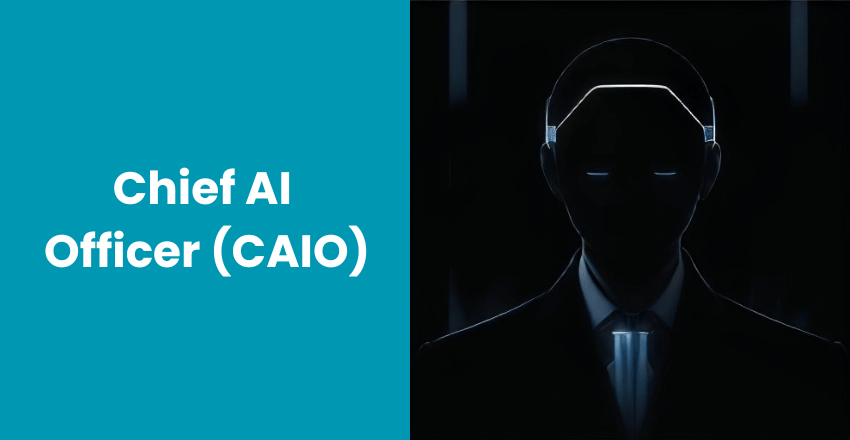
Chief AI Officer (CAIO): Pioneering AI Leadership and Vision – Spearheading the development and implementation of AI initiatives, ensuring technological advancement and strategic growth in fast-paced industries.
Most organizations regard the Chief AI Officer (CAIO) as a mere luxury, an optional add-on for tech companies with excessive budgets.
Unfortunately, the underestimated power and potential of AI are often overshadowed by fears of sky-high implementation costs and inadequate infrastructure.
Driving AI Strategy and Innovation: As artificial intelligence (AI) becomes more integral to businesses, there’s a growing realization of the need for focused leadership. The Chief AI Officer (CAIO) fulfills this role.
Leading AI Implementation: The CAIO plays a pivotal role in steering the company’s AI initiatives. Specifically, they lead a team dedicated to exploring and utilizing AI for enhancing business processes and achieving strategic objectives.
Balancing AI Expertise and Business Insight: Moreover, the CAIO skillfully blends their profound knowledge of AI technologies with sharp business insight. This unique combination enables them to make decisions that propel innovation, efficiency, and productivity forward.
Through these responsibilities, CAIOs are becoming key figures in guiding businesses towards successful AI integration and advancement.
Key Takeaways
- The Chief AI Officer (CAIO) is a key leadership position in organizations that are invested in harnessing AI to transform business processes
- The CAIO is responsible for overseeing the implementation of AI initiatives and driving innovation within the company
- The role of the CAIO requires a deep understanding of AI technologies and business acumen to make informed decisions that drive efficiency and productivity
The Importance of AI Leadership in Organizations
The advent of artificial intelligence (AI) has significantly transformed business strategies and operations. Consequently, organizations are increasingly relying on AI to foster innovation and efficiency, which necessitates dedicated AI leadership roles.
In response to this need, the Chief AI Officer (CAIO) has become a crucial executive position. Tasked with spearheading AI initiatives, the CAIO is responsible for fine-tuning the AI strategy to complement the overall business objectives.
With technology evolving rapidly, companies that overlook the importance of AI leadership may fall behind their competitors. A robust AI leadership team is instrumental in helping organizations stay at the forefront of innovation and maximize the benefits of AI technology.
Crucially, the CAIO is integral in promoting AI adoption and aligning AI strategies with business goals. Their expertise in AI technologies and decision-making processes equips organizations to make strategic choices, keeping them ahead in competitive markets.
As the demand for AI leadership escalates, it’s becoming increasingly important for organizations to focus on creating positions like the CAIO. This approach ensures the availability of specialized expertise, vital for steering successful AI projects and shaping the future of various industries.
Understanding the Responsibilities of a Chief AI Officer (CAIO)
In today’s digital age, a Chief AI Officer (CAIO) plays a pivotal role in driving innovation and transformational change in organizations.
As companies increasingly embrace artificial intelligence (AI) technologies to optimize their business operations, the CAIO is responsible for overseeing AI initiatives and driving adoption throughout the organization.
The responsibilities of a CAIO include:
| Responsibility | Description |
|---|---|
| Developing AI Strategy | The CAIO is responsible for creating an overarching AI strategy that aligns with the organization’s goals and objectives. |
| Overseeing AI Initiatives | The CAIO is responsible for overseeing the development, implementation, and maintenance of AI initiatives within the organization. |
| Making Data-Driven Decisions | The CAIO must use data and analytics to inform AI-related business decisions and ensure that AI initiatives contribute to overall business success. |
| Collaborating with Other Executives | The CAIO must work collaboratively with other senior executives to align AI objectives with broader business goals and to ensure that AI initiatives are integrated with other business processes. |
As the leader of AI initiatives within an organization, the CAIO must also navigate complex ethical considerations, particularly when it comes to ensuring transparency, data privacy, and the responsible use of AI technologies.
The CAIO must make informed decisions that balance ethical considerations with business objectives.
In addition to these responsibilities, the CAIO must also possess strong leadership and communication skills to effectively lead cross-functional teams and collaborate with other executives.
As AI technologies continue to evolve and become more embedded in business operations, the role of a Chief AI Officer (CAIO) will become increasingly crucial in driving innovation and creating value for organizations.
The Distinction Between CAIO and CTO

In the realm of artificial intelligence (AI), the roles of Chief AI Officer (CAIO) and Chief Technology Officer (CTO) may seem interchangeable, but they serve distinct purposes within an organization.
While both roles are concerned with technology, the CAIO is specifically responsible for developing strategic initiatives that leverage AI to drive innovation and transformation across the business, while the CTO is focused on overseeing the company’s overall technology infrastructure and ensuring its smooth operation.
The CAIO brings a unique perspective to the table, with specialized knowledge of AI technologies and their potential applications. They are charged with overseeing initiatives that use AI to create new revenue streams, optimize existing business processes, and improve customer experiences.
On the other hand, the CTO is responsible for implementing and maintaining technology systems across all areas of the organization, ensuring they are secure and functional.
While there is some overlap between the roles, a company that is interested in prioritizing AI development should consider adding a separate executive position for a Chief AI Officer (CAIO).
This will ensure that the organization has a dedicated leader with the skills and knowledge necessary to successfully drive AI initiatives forward and keep the company competitive in a rapidly evolving technological landscape.
The Role of AI in Transforming Business Strategies
The Chief AI Officer (CAIO) plays a pivotal role in leveraging AI technology to transform and optimize business strategies, enabling organizations to gain a competitive edge.
With a deep understanding of AI strategy leadership and AI decision-making roles, the CAIO is responsible for driving AI adoption throughout the organization, integrating AI into all aspects of business operations.
The CAIO works closely with other executive roles to define the organization’s AI vision, goals, and roadmap, ensuring alignment with overall business objectives. By identifying opportunities for AI-powered innovation, the CAIO helps organizations stay ahead of the competition and stay relevant in an increasingly digital world.
The Importance of Collaboration
Collaboration between a CAIO and other executive roles, such as the CEO, CTO, and CIO, is vital in driving successful AI initiatives. By working together, executives can align AI strategies with overall business goals and ensure that AI projects are implemented effectively. This collaborative approach also helps to mitigate risks and identify potential areas of improvement.
The Future of AI Leadership
The future of AI leadership is bright, with the role of the CAIO becoming increasingly critical in transforming business strategies. As AI technology continues to advance, the need for dedicated AI leadership positions will only grow. The CAIO will play a vital role in driving AI innovation and shaping the digital future.
The Growing Demand for CAIO in Tech Companies
Increasing Need for CAIOs: In the current technology-driven world, the demand for Chief AI Officers (CAIOs) is growing rapidly. The widespread use of AI across various industries has highlighted the necessity for specialized executive roles. These roles are focused on leading AI initiatives and fostering innovation. Particularly in tech companies, this trend is pronounced as they strive to use AI for a competitive market advantage.
Critical Role in Tech Companies: Specifically, in tech companies, the role of a CAIO is extremely important. AI is often central to their products and services. CAIOs are tasked with managing AI projects, ensuring ethical AI usage, and promoting AI integration within the organization.
Collaboration with Other Executives: Additionally, CAIOs work in tandem with other key executives, like the CEO, CTO, and CIO. Their goal is to ensure AI strategies are in sync with the broader business objectives.
Through these responsibilities, CAIOs in tech companies play a pivotal role in leveraging AI for business growth and innovation.
Building an Effective AI Team under CAIO Leadership

Driving AI Innovation and Strategy: In today’s business world, transformed by AI, the Chief AI Officer (CAIO) plays a crucial role. They lead AI innovation and strategize AI applications in organizations. However, the effectiveness of their AI team is equally important for the success of AI initiatives.
Building a Diverse and Skilled AI Team: Firstly, the CAIO must cultivate a team that combines diverse talents, including data scientists, software engineers, and domain experts. It’s essential for the CAIO to align the team with the organization’s overall objectives and clarify their roles in AI strategy and execution.
Guiding and Mentoring the AI Team: Moreover, the CAIO should mentor their team, fostering an environment of continuous learning and development. Keeping abreast of the latest AI advancements, industry trends, and best practices is crucial for this guidance.
By focusing on these aspects, the CAIO can ensure the AI team is well-prepared and effective, contributing significantly to the organization’s AI-driven growth.
| Key Strategies for Building an Effective AI Team | Description |
|---|---|
| Collaboration | The AI team must work collaboratively to deliver effective AI solutions. Collaboration ensures that the team can benefit from diverse perspectives and expertise to drive innovation and overcome challenges. |
| Communication | Effective communication is essential to ensuring that the team is aligned with the organization’s goals and objectives. This includes regular updates on progress, feedback, and constructive criticism to ensure that the team is constantly improving. |
| Continuous Learning | The CAIO should promote a culture of continuous learning and development to ensure that the AI team stays up-to-date with the latest AI advancements, industry trends, and best practices. This includes providing training, workshops, and other resources to enable the team to develop new skills and knowledge. |
Ultimately, building an effective AI team requires strong leadership from the CAIO, who must ensure that the team has the resources, guidance, and support needed to drive innovative AI projects and deliver real business value. By fostering collaboration, communication, and continuous learning, the AI team can maximize their potential and help organizations harness the full power of AI technology.
Strategies for Implementing AI in Business Operations
Leading AI Integration: As the Chief AI Officer (CAIO), your key responsibility is to spearhead AI technology integration to enhance productivity and efficiency. Here are strategies to assist in this process:
Identifying High-Value AI Applications: Firstly, pinpoint routine and repetitive tasks suitable for AI automation. This approach not only boosts productivity but also allows your team to focus on more strategic tasks.
Collaboration with Cross-Functional Teams: Moreover, forming a cross-functional team encompassing various business units is crucial. This ensures AI initiatives align with broader business objectives and helps identify and address potential challenges, securing stakeholder buy-in.
Ensuring Data Quality: Additionally, maintaining accurate and high-quality data is vital for effective AI application. As a CAIO, ensuring clean, reliable, and well-structured data is fundamental for informed AI decision-making.
Investing in Suitable AI Tools: Investing in the right AI tools and platforms is imperative. Conduct comprehensive research to understand your organization’s unique needs and choose tools that fit these requirements.
Developing an AI Governance Framework: Lastly, establishing a robust AI governance framework is essential for ethical and responsible AI usage. This framework should include clear guidelines and policies on data privacy, transparency, and accountability.
Successful AI Implementation: Implementing AI in business is complex. However, by employing these strategies and utilizing your expertise as a CAIO, you can effectively lead and optimize AI implementation in your organization.
Overcoming Challenges in AI Implementation

Overcoming AI Adoption Challenges: As a Chief AI Officer (CAIO), addressing various challenges in AI implementation, such as data privacy concerns and employee resistance, is crucial.
Ensuring Ethical and Transparent AI: A key responsibility is making AI decision-making transparent and ethical. The CAIO must balance the benefits to the company and its stakeholders with adherence to ethical standards and data privacy laws. Understanding AI algorithms and committing to ethical AI practices are essential.
Addressing Employee Resistance: Overcoming employee fears about AI is important. Involving them in the AI implementation and providing necessary training builds trust. It promotes a collaborative and innovative culture.
Tackling Technical Challenges: The CAIO must also address technical issues like data quality, system integration, and scalability. This involves a deep understanding of AI’s technical aspects and close collaboration with IT and other stakeholders.
Guiding Successful AI Adoption: The CAIO’s role is to lead the organization through AI implementation challenges. This requires staying informed, proactive, and working with other executives and stakeholders. The goal is to harness AI’s full potential for innovation and achieving business goals.
The Role of AI in Transforming Business Strategies
Leveraging AI for Competitive Advantage: The Chief AI Officer (CAIO) is crucial in using AI to transform business strategies. This helps organizations gain a competitive edge.
Developing AI-Based Business Models: The CAIO’s duty includes creating business models powered by AI. They focus on new revenue streams, finding new customer segments, and utilizing data for personalized products and services.
Driving AI Adoption: Collaborating with other executives, the CAIO promotes AI adoption across the organization. They might develop training programs, identify practical AI use cases, and foster a culture that embraces AI innovation.
Goal of the CAIO: The CAIO aims to use AI for strategic growth and opportunity creation. By applying AI in decision-making, they position organizations to outpace competitors and achieve lasting success.
Collaboration between CAIO and Other Executive Roles
Aligning with Company Vision: The CAIO must collaborate closely with the CEO. Their goal is to ensure AI initiatives align with the company’s vision and mission.
Integrating AI with Technology: Working with the CTO is essential. The CAIO ensures effective integration of AI technologies into the existing tech infrastructure.
Addressing Data Privacy and Cybersecurity: The CAIO also needs to collaborate with the CIO. Together, they address data privacy and cybersecurity in AI decision-making.
Ensuring Alignment with Company Goals: By working with other executives, the CAIO ensures AI initiatives align with overall company objectives and are smoothly integrated into business processes.
Ethical AI Decision-Making and the Chief AI Officer’s Role

Upholding Ethical Practices: In the era of AI-driven industry transformations, maintaining ethical AI decision-making is crucial. The Chief AI Officer (CAIO) is key in ensuring these ethical standards.
Overseeing Ethical AI Initiatives: A primary duty of a CAIO is to manage AI projects, aligning them with ethical principles. This involves preventing discrimination and bias in AI algorithms. CAIOs are also responsible for safeguarding data privacy, ensuring sensitive information is protected and handled responsibly.
Ensuring Transparency: Transparency in AI processes and algorithms is critical. CAIOs should make sure these are clear to all stakeholders. This transparency fosters trust and prevents misuse and ethical breaches.
Legal and Regulatory Compliance: CAIOs must be aware of legal and regulatory aspects of AI. They should ensure organizational compliance with all relevant laws, adapting to changes as necessary.
Commitment to Continuous Learning: Ethical AI leadership demands ongoing learning. CAIOs should stay informed about industry trends and best practices in ethical AI to ensure their organizations operate responsibly and effectively.
Evolving Role of Chief AI Officer (CAIO)
Staying Updated and Driving Innovation: For a CAIO, it’s crucial to stay informed about the latest AI advancements and industry trends. This ongoing education fuels innovation. CAIOs must engage in continuous learning to navigate the rapidly changing tech landscape and lead AI projects effectively.
Engaging with AI Community: CAIOs should regularly participate in industry events, online courses, and review research publications. Staying connected with the latest in AI is key.
Networking with AI Professionals: Building a network with other AI leaders is vital. CAIOs should attend networking events and industry forums. Collaborating with peers enhances learning and innovation.
Broadening Expertise Beyond AI: A CAIO’s knowledge should extend to business strategy, data science, and cybersecurity. Understanding these fields is essential for making informed decisions and explaining AI’s value to others.
Importance of Continuous Learning: Continuous learning helps CAIOs stay current with AI advancements, build professional networks, and expand their expertise. This is essential for leading AI initiatives and fostering innovation within their organizations.
Final Thoughts
Critical Importance: The Chief AI Officer (CAIO) is increasingly vital in today’s digital world. Organizations are adopting AI technologies to improve operations and stay competitive. This creates a clear need for dedicated AI leadership positions, such as the CAIO.
Responsibilities: CAIOs are central in developing and executing AI strategy. They manage AI initiatives, base decisions on data, and integrate AI into business strategies. Effective leadership from CAIOs involves teamwork with other executives and following best practices in AI deployment.
Staying Current and Ethical: It is essential for CAIOs to keep up with AI advancements and trends. They must ensure ethical AI use and protect data privacy. By focusing on these areas and leading AI innovation, CAIOs significantly influence the future of the digital world.
External Resources
https://www.linkedin.com/pulse/strategic-importance-chief-artificial-intelligence-axrff
FAQ

Q: What is the role of a Chief AI Officer (CAIO) in companies?
A: The role of a Chief AI Officer (CAIO) is to harness artificial intelligence to transform business strategies and drive innovation in our digital-centric world.
Q: What are the responsibilities of a Chief AI Officer (CAIO)?
A: A Chief AI Officer (CAIO) is responsible for overseeing AI initiatives, making data-driven decisions, and driving AI adoption throughout the organization.
Q: How does a Chief AI Officer (CAIO) differ from a Chief Technology Officer (CTO)?
A: A Chief AI Officer (CAIO) focuses specifically on AI implementation, while a Chief Technology Officer (CTO) has a broader range of responsibilities related to technology.
Q: How does a Chief AI Officer (CAIO) transform business strategies?
A: A Chief AI Officer (CAIO) leverages AI technology to optimize business strategies, enabling organizations to gain a competitive edge.
Q: Why is there a growing demand for Chief AI Officers (CAIOs) in tech companies?
A: Technology companies recognize the critical role that Chief AI Officers (CAIOs) play in leading AI initiatives and driving innovation in a technology-driven landscape.
Q: What is the importance of building an effective AI team under CAIO leadership?
A: Building an effective AI team under Chief AI Officer (CAIO) leadership is crucial for successful AI projects, as it requires collaboration and expertise.
Q: What strategies can a Chief AI Officer (CAIO) use to implement AI in business operations?
A: A Chief AI Officer (CAIO) can employ various strategies and best practices to effectively implement AI technologies in different business operations, optimizing efficiency and productivity.
Q: What are the common challenges in AI implementation and how does a Chief AI Officer (CAIO) overcome them?
A: Common challenges in AI implementation include decision-making and strategic planning, which a Chief AI Officer (CAIO) addresses through informed decision-making and strategic planning.
Q: How can the success of AI initiatives be measured?
A: A Chief AI Officer (CAIO) can measure the success and impact of AI initiatives through metrics and key performance indicators (KPIs), demonstrating the value of AI in achieving business objectives.
Q: How does a Chief AI Officer (CAIO) collaborate with other executive roles?
A: Collaboration between a Chief AI Officer (CAIO) and other executive roles, such as the CEO, CTO, and CIO, is crucial in driving AI initiatives and aligning AI strategies with overall business goals.
Q: What ethical considerations must a Chief AI Officer (CAIO) uphold in AI leadership?
A: A Chief AI Officer (CAIO) must ensure ethical AI practices, data privacy, and transparency in AI decision-making processes.
Q: Why is continuous learning and development important for Chief AI Officers (CAIOs)?
A: Continuous learning and development are essential for Chief AI Officers (CAIOs) to stay updated with the latest AI advancements and industry trends, driving innovation.
Benjamin Bale is a distinguished expert in the field of AI development and an esteemed author for the “Hire AI Developer” blog. With a remarkable decade-long experience in the industry, Benjamin has cemented his reputation as a leading authority in AI app and website development, as well as AI backend integrations. His profound passion for AI and its transformative potential is evident in every aspect of his work.
Benjamin’s journey into the world of AI began at Edinburgh University, where he pursued his studies in AI and Mathematics. It was during this time that he cultivated a deep understanding and fascination for the subject. Throughout his career, Benjamin has accumulated extensive experience working with industry giants such as Goldman Sachs, Tencent, and Ali Express. These invaluable experiences have not only sharpened his skills in integrating existing systems with AI APIs but have also solidified his status as a consummate professional in the field.
Currently residing in the vibrant city of London, Benjamin finds solace in his role as both an author and developer. Beyond his professional endeavors, he takes great joy in the company of his faithful canine companion, Chad, and indulges his passion for snowboarding in the picturesque mountains of France. Benjamin’s unwavering dedication to advancing AI technology, combined with his wealth of knowledge and practical expertise, make him an invaluable asset to the “Hire AI Developer” team and an invaluable resource for readers seeking profound insights into the realm of AI.







